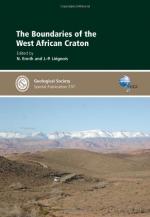|
This section contains 499 words (approx. 2 pages at 300 words per page) |

|
Cratons are large regions of continental crust that have remained tectonically stable for a prolonged period of time, often a billion years or more. Precambrian cratons are commonly cored by Archaean granite-greenstone terrains and may be partly covered by sedimentary platform sequences. The North American Craton, Laurentia, which constitutes much of North America, formed by the assembly of smaller cratons in the Archean and Paleoproterozoic. Cratons are surrounded by orogenic (mountain building) or mobile belts, within which deformation has been localized. For example, cratons comprised of Archean granite-greenstone terrains and Paleoproterozoic sedimentary sequences in Africa, central India and Western Australia are rimmed by Mesoproterozoic and Neoproterozoic orogenic belts, many of which have been subsequently reactivated during rifting and the formation of Paleozoic sedimentary basins. Only minor reactivation of older structural weaknesses occurs in craton interiors during deformation on their margins.
Cratons have thick lithospheric roots or keels. Lithospheric...
|
This section contains 499 words (approx. 2 pages at 300 words per page) |

|


